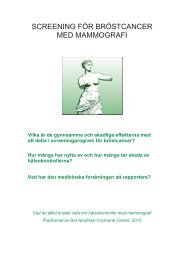1 Selective serotonin reuptake inhibitors (SSRI) â sales, withdrawal ...
1 Selective serotonin reuptake inhibitors (SSRI) â sales, withdrawal ...
1 Selective serotonin reuptake inhibitors (SSRI) â sales, withdrawal ...
Create successful ePaper yourself
Turn your PDF publications into a flip-book with our unique Google optimized e-Paper software.
than in the former DSM-III were described.<br />
1988 The first <strong>SSRI</strong>s were launched.<br />
Committee on Safety of Medicines (UK) published a new statement that benzodiazepines<br />
cause dependence.<br />
It was recommended to use the drugs only for two to four weeks. The Committee concluded<br />
that dependence to benzodiazepines was “becoming increasingly worrying”.<br />
1989<br />
1990<br />
1991 Case reports about <strong>SSRI</strong> <strong>withdrawal</strong> reactions published<br />
1992 The International Classification of Diseases (ICD-10) was published. Withdrawal reactions<br />
were described as an autonomous diagnosis at the same level as dependence.<br />
1993 MCA (UK) published a warning to prescribers and patients about the possibility of<br />
<strong>withdrawal</strong> reactions from paroxetine, based on spontaneous reporting.<br />
1994 DSM-IV published. Withdrawal reactions were described as an autonomous diagnosis at the<br />
same level as dependence.<br />
1995 Flunitrazepam was transferred from Schedule IV to the more restrictive Schedule III in the<br />
1971 United Nations Convention on Psychotropic Substances.<br />
1996 Authorities describe <strong>SSRI</strong> <strong>withdrawal</strong> reactions as rare and relatively mild.<br />
Closed symposium on “Antidepressant discontinuation events” sponsored by Eli Lilly.<br />
UK authorities published a review of <strong>SSRI</strong> <strong>withdrawal</strong> reactions with the conclusion that<br />
there was no evidence of a physical dependence problem with the <strong>SSRI</strong>s and that<br />
<strong>withdrawal</strong> reactions were rare and “relatively mild”.<br />
1997 A supplement to the Journal of Clinical Psychiatry was published with several proceedings<br />
from the symposium in 1996. The supplement was sponsored by Eli Lilly.<br />
1998 At a meeting in the Committee on Safety of Medicines (UK) an Eli Lilly representative<br />
expressed concern of the use of the term “<strong>withdrawal</strong> reaction” when referring to the<br />
symptoms occurring on withdrawing treatment due to the fact that the term “<strong>withdrawal</strong>”<br />
has a specific meaning and implies that the drug is addictive. Lilly suggested the term<br />
“discontinuation reactions”.<br />
Charles Medawar likened <strong>SSRI</strong>s to benzodiazepines with respect to their ability to cause<br />
dependence, which started a review process in EMA (Europe) and in MCA (UK).<br />
It was suggested in an editorial in BMJ that the incidence of <strong>withdrawal</strong> reactions from<br />
<strong>SSRI</strong>s was 35%, mostly mild to moderate, shortlived, preventable and simple to treat.<br />
1999<br />
2000 Committee for Proprietay Medicinal Products: “the studies were not designed to study<br />
<strong>withdrawal</strong> phenomena in <strong>SSRI</strong>s. It was suggested in a correspondence in The Lancet that<br />
there was an incidence rate of <strong>withdrawal</strong> reactions between 35% and 78% and with a<br />
characteristic <strong>SSRI</strong> <strong>withdrawal</strong> syndrome.<br />
2001<br />
2002 <strong>SSRI</strong>s were among the 30 highest-ranking drugs in the list of drugs for which dependence<br />
has ever been reported to the Uppsala Monitoring Centre database.<br />
In USA paroxetine had been marketed directly to consumers as “non-habit forming” but<br />
FDA published a warning against paroxetine and the risk of <strong>withdrawal</strong> symptoms.<br />
2003 Data on the frequency of <strong>withdrawal</strong> reactions after use of paroxetine were presented at a<br />
meeting in the Committee on Safety of Medicines: 10% of the patients may experience<br />
<strong>withdrawal</strong> reactions due to paroxetine.<br />
19





